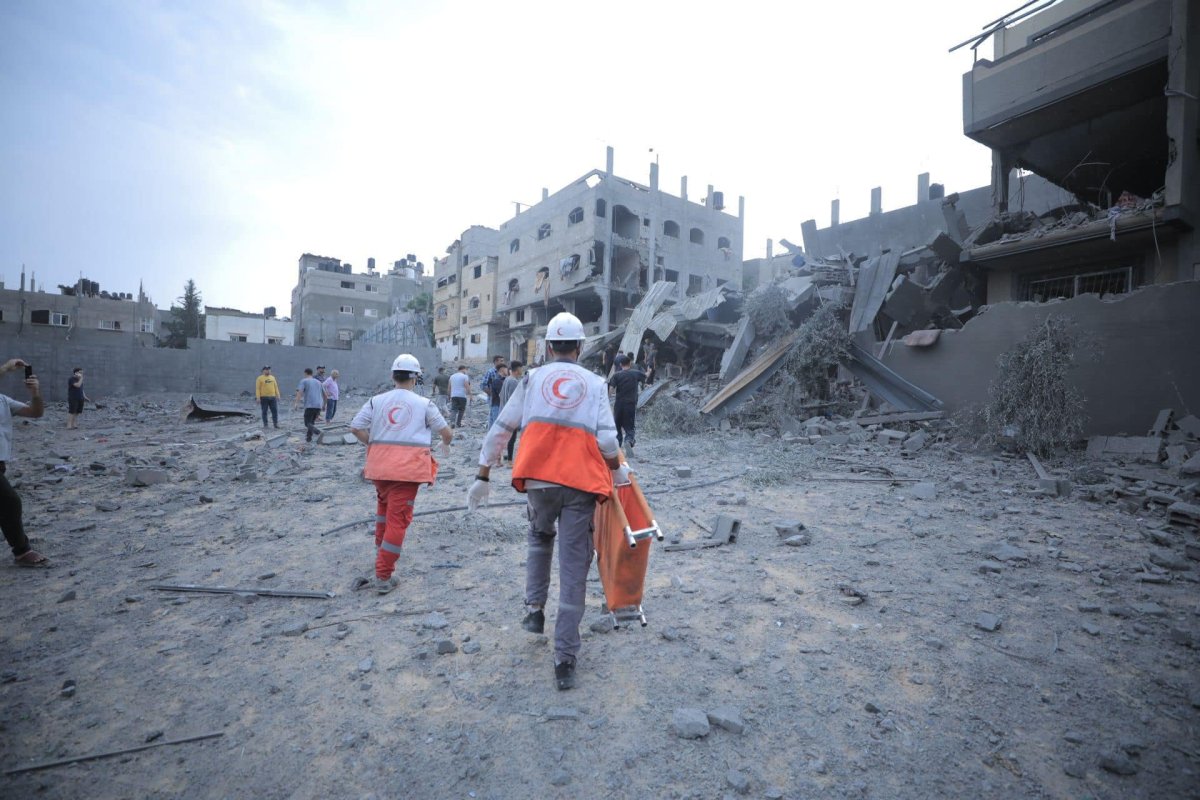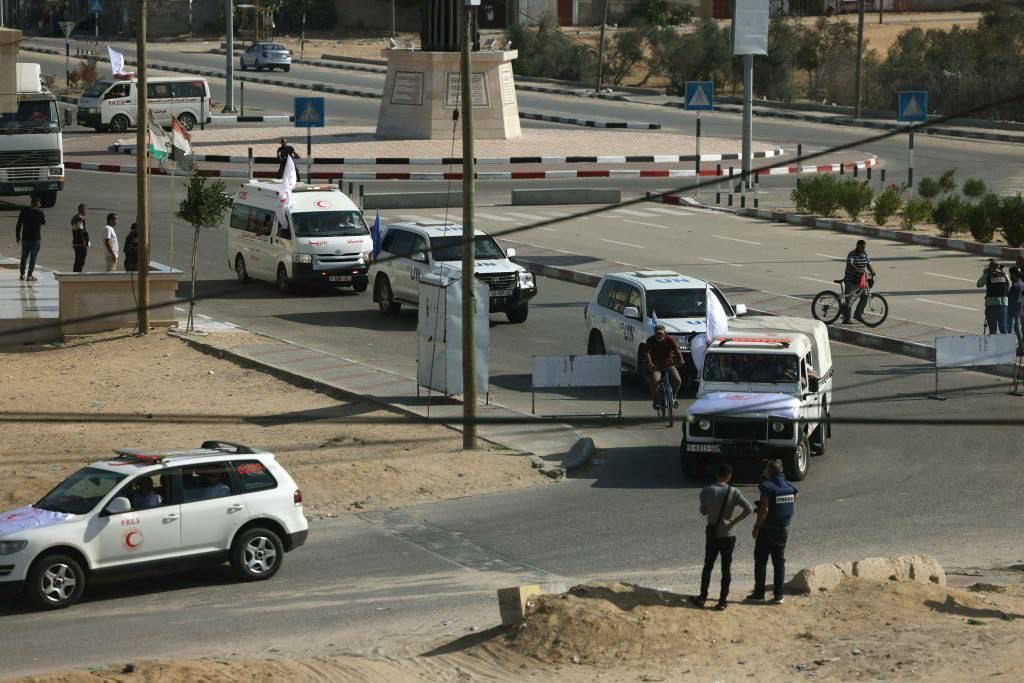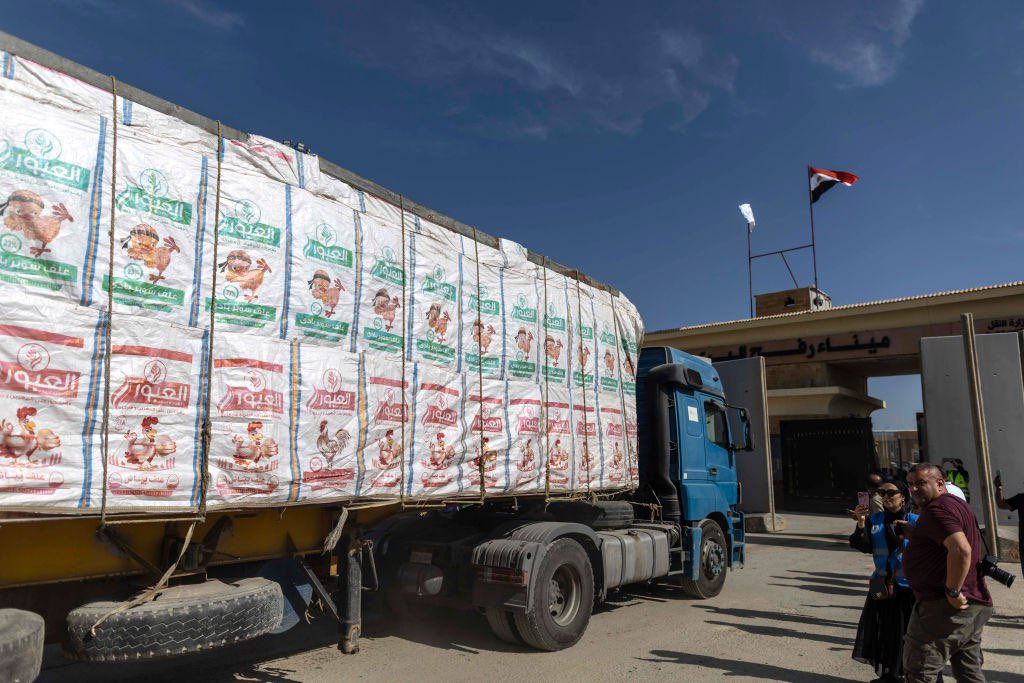Conflict in Israel and the Occupied Palestinian Territories
The hostilities that began on Oct. 7 caused significant devastation, claimed thousands of lives and unleashed an unprecedented humanitarian crisis that continues to worsen.
Belgian Red Cross-Flanders 's partner on the ground, the International Red Cross Committee (ICRC), fulfills a vital role as a neutral mediator and guardian of international humanitarian law in the conflict zone to all sides. They provide aid to both sides of the conflict, support hospitals in Gaza by providing much-needed medical supplies and have deployed a 24-hour surgical team to save lives of seriously injured patients. In addition, they have mobilized several tons of humanitarian aid to alleviate the immense human suffering.
As civilian casualties increase, Belgian Red Cross-Flanders urges all parties involved to respect international humanitarian law: civilians must be protected, and humanitarian workers must be able to safely assist affected people.
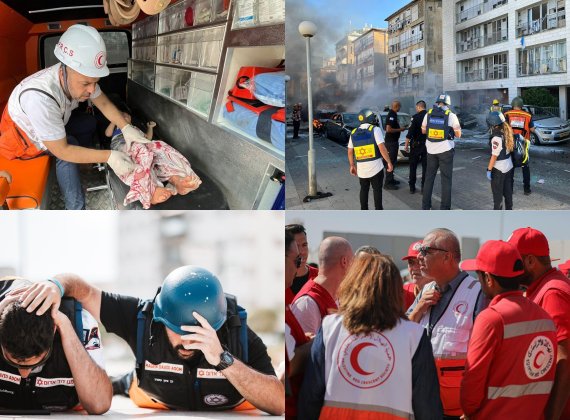
Red Cross Movement in Israel and the Occupied Palestinian Territories
In Israel: Magen David Adom, also known as the Israeli Red Cross, is essential to the Israeli health system. It supports transfers between hospitals, deploying 1,500 ambulances to do so. MDA has mobilized an extensive network of volunteers who work closely with medical staff to provide emergency relief and also serves as the country's main supplier of blood products.
In the Occupied Palestinian Territories: The Palestinian Red Crescent Society (PRCS) remains the main provider of medical emergency relief in the occupied Palestinian territory, with a fleet of ambulances and health workers working 24 hours a day in difficult conditions. PRCS operates two hospitals, Al-Quds in Gaza City and Al Amal in Khan Younis, which provide intensive care and have three operating rooms.
Those affected by the conflict in Israel and the Occupied Palestinian Territories will need all the help they can get, not only in the coming weeks, but also in the months to come. Flemish people who want to support those affected can contribute via this site or the Belgian Red Cross-Flanders account number BE53 0000 0000 5353 with the mention'Conflict Middle East'.
Updates
Friday, June 21 - ICRC office damaged by nearby attack.
The attack Friday afternoon, June 21, near the infrastructure of the International Committee of the Red Cross (ICRC) in Gaza, caused a massive influx of casualties at the nearby ICRC field hospital. There are reports of 22 dead and 45 wounded, with several reports of additional casualties.
The ICRC office and other facilities, clearly marked and protected by the Red Cross emblem, were damaged.
Under international humanitarian law, parties to the conflict have a duty to take all possible precautions to prevent the suffering of civilians and damage to civilian objects, including humanitarian infrastructure.
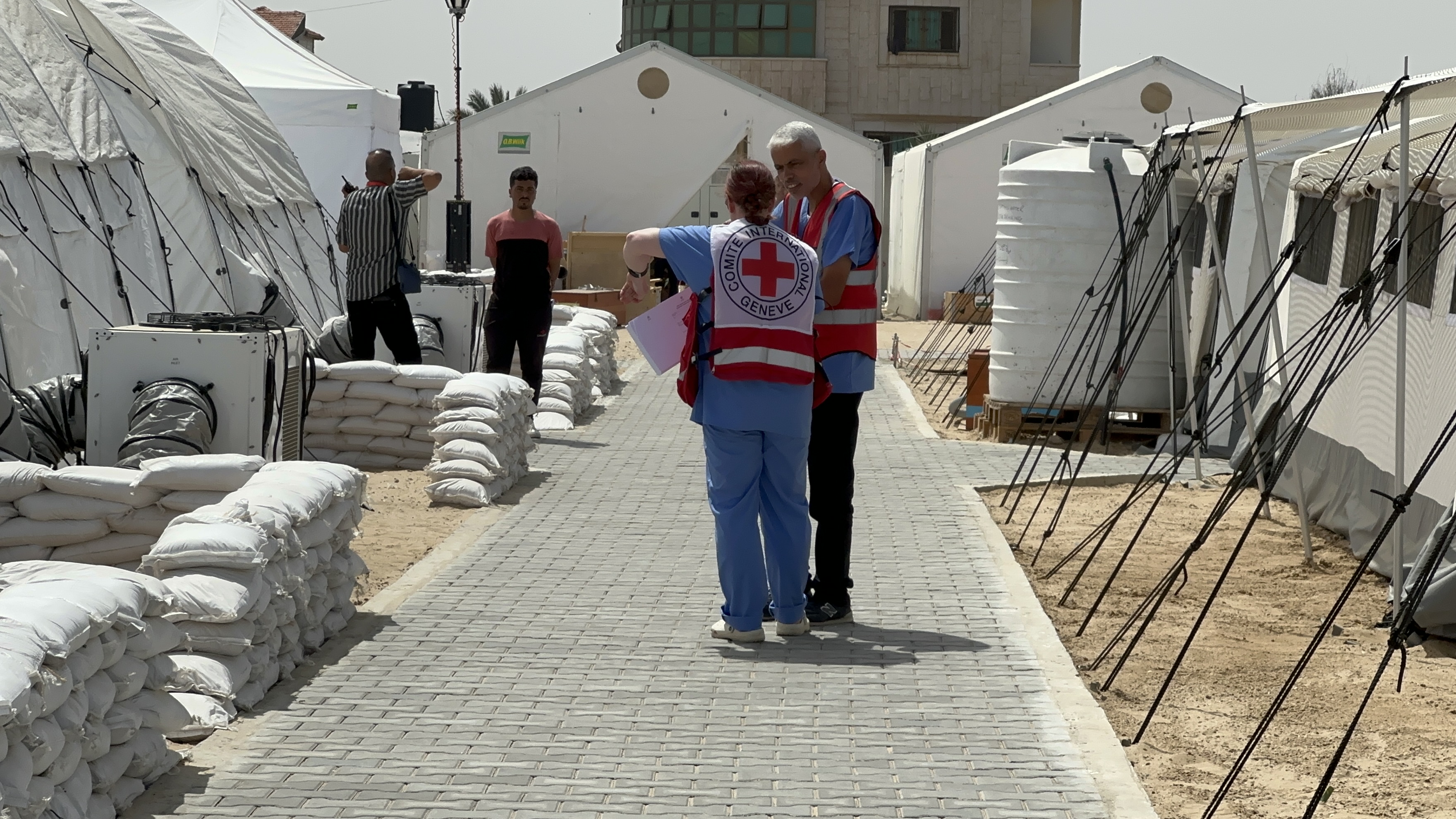
Last month, the ICRC field hospital, in cooperation with the Palestinian Red Crescent and 12 other National Red Cross Societies, was opened in Rafah. In this first month, 5,681 consultations have already taken place and 155 operations have been performed. A large part of the patients treated are children. In addition, 42 babies were also born.
230 staff members work day and night to meet the high needs of the Palestinian population.
Belgian Red Cross-Flanders reiterates his call and asks all parties involved to respect International Humanitarian Law. Civilians, aid workers and civilian infrastructure should never be the object of attack.
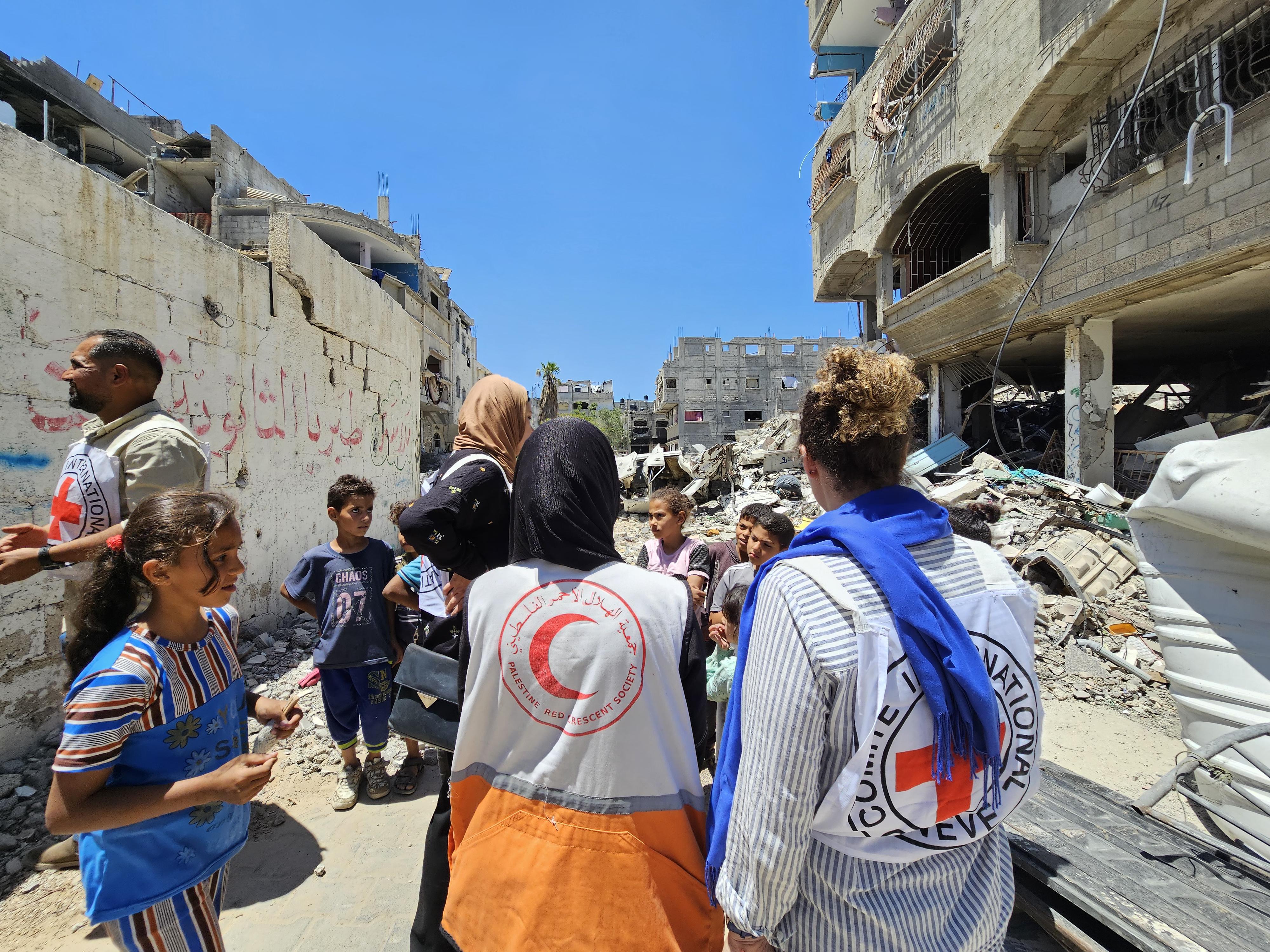
Wednesday, May 15 - Red Cross opens 60-bed field hospital in Rafah
The International Committee of the Red Cross (ICRC) and 11 National Red Cross Societies have joined forces to open a field hospital in Rafah, Gaza. This initiative is intended to help the Palestinian Red Crescent Society (PRCS) address the enormous medical needs arising from the ongoing conflict. At full capacity, the field hospital will be able to treat 200 people daily.
The initiative is designed to support the Palestinian Red Crescent Society in providing medical care. Since the beginning of hostilities, PRCS staff and volunteers continue to provide emergency relief to the people of Gaza amid an unacceptably high number of casualties. Seventeen PRCS employees have already died while performing their duties, and crucial infrastructure was damaged, including 2 hospitals, multiple medical aid stations and 25 ambulances. Despite these extremely difficult conditions, the PRCS continues to do exceptional work to meet the medical needs of the people of Gaza.
The 60-bed field hospital will provide facilities for emergency surgery, care for pregnant women, mothers and newborns, pediatric and outpatient care. The hospital will also provide capacity to provide emergency care for a large number of injured people.
Welcome Sanad
This little boy is the first baby to come into the world at the hospital. His mom did not find care anywhere during her pregnancy and was happy that she could be helped to give birth.
"Sanad means 'support.' We hope he will be our support." said mom Reem Abo Mousa.

Unfortunately, the problems of these, and thousands of other families, are not yet done. Health needs in Gaza continue to increase by the day. Therefore, the Red Cross Movement reiterates its call to protect medical facilities, as stipulated under International Humanitarian Law. No patient should be killed while lying in a hospital bed. No doctor, nurse or other medical professional should die while trying to save lives.
Belgian Red Cross-Flanders calls on all parties to the conflict to respect International Humanitarian Law. Civilians, aid workers and civilian infrastructure should never be the object of attack.
Wednesday, April 8, 2024 - Rafah
Belgian Red Cross-Flanders is deeply concerned about the precarious humanitarian situation in the Gaza Strip. The new military operation at Rafah increases human suffering and blocks access of vital humanitarian aid.
This blockade undermines the humanitarian efforts that are largely coordinated from Rafah and are vital. We look with fearful hearts at the more than one million people currently residing in Rafah who had hoped to have found safety there. The call for evacuation of civilians, already exhausted after seven months of violence and lack of food and water, is inhumane, especially for the elderly, sick, wounded, disabled and pregnant women. Moreover, people have already been forced to move several times and had been told that Rafah is a safe place.
It is the responsibility of all parties to this conflict to ensure that civilians have access to adequate food, potable water and shelter wherever they are. In addition, contact between family members must be guaranteed.
To save lives and alleviate suffering, we repeat our call to:
- Protection of civilians, humanitarian workers and civilian infrastructure, especially medical facilities.
- Secure and unhindered humanitarian access to the entire Gaza Strip, including the north.
- Immediate and unconditional release of all hostages.
Humanity must come first at all times and all possible steps must be taken to protect citizens.
#NotATarget
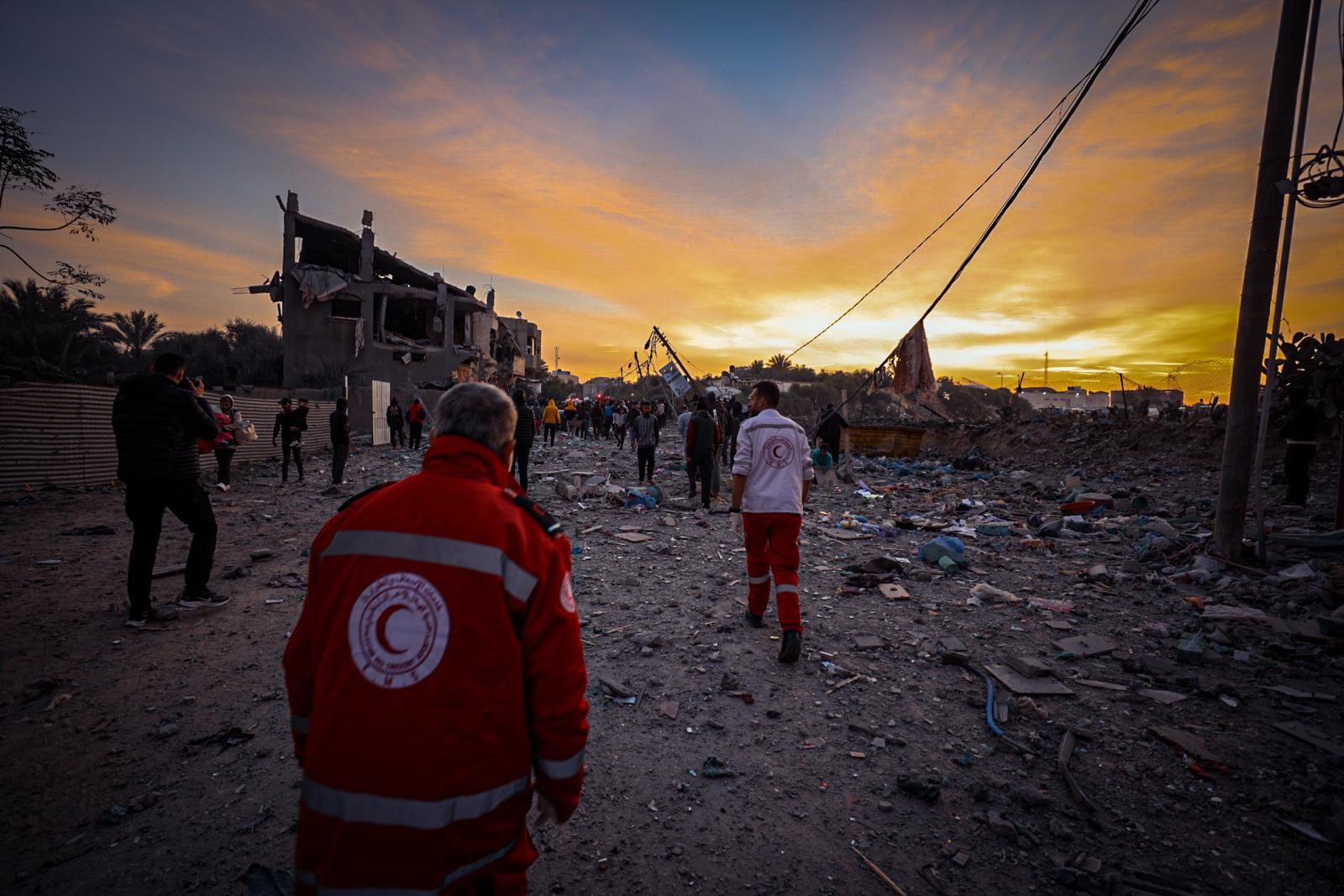
Sunday, April 7, 2024 - 6 months conflict
Six months after the start of the Middle East conflict, Belgian Red Cross-Flanders continues to call for respect and compliance with International Humanitarian Law to protect the lives of civilians and humanitarian personnel, for a smoother and safer passage of more humanitarian aid to affected areas, and for the unconditional release of all hostages.
Thus, helping Belgian Red Cross-Flanders
Red Cross-Flanders has so far collected more than € 240,000 to support the relief efforts on the ground. That financial support goes to the International Committee of the Red Cross (ICRC), which is active along both sides of the conflict and has been providing support to all sides from day one.
Specifically, the ICRC acted as a neutral intermediary in the transfer of the 109 Israeli hostages and more than 150 Palestinian prisoners. In addition, they employ 2 surgical teams at the European Gaza Hospital in Khan Younis who have already performed 1,625 surgeries since last November. They are also providing emergency medical supplies, sheltering IDPs, meeting the basic needs of the affected population and carrying out repairs to the water and electricity systems. Thanks to the ICRC, 1,392 family contacts were also restored.
Meanwhile, other National Red Cross Societies and the International Federation of Red Cross and Red Crescent Societies (IFRC) are helping whenever possible. Here, the Palestinian Red Crescent is undoubtedly the most important actor. Since the beginning of the conflict, they have been providing first aid and medical emergency relief, helping internally displaced persons, distributing emergency relief supplies and providing psychosocial assistance in Gaza and the West Bank. In addition, they have set up 14 tent camps providing shelter to 5,100 families in Gaza. In total, they have already reached more than 274,000 people.
Sunday, January 7, 2024 - 3 months conflict
Three months ago, on Oct. 7, 2023, the conflict in Israel and the Occupied Palestinian Territories escalated. Currently, humanitarian needs remain enormous, especially in Gaza, where access to aid remains very limited. Human suffering is significant, with the loss of civilians, destruction of homes and infrastructure, detention of hostages and fear among their families. The situation is alarming, with the civilian population paying the highest price.
Hamas' initial attack on Israel killed more than 1,250 Israelis and foreigners, and 240 people were kidnapped. Rockets continue to be fired daily at Israeli cities and the Occupied Palestinian Territories. According to the UN, more than 23,000 people have been killed since Oct. 7, 70% of them women and children. More than 62,000 people have been injured, 7,000 are missing or believed to be buried under rubble. In Gaza, nearly 2 million people have had to leave their homes and have limited access to basic services.
We call for respect for International Humanitarian Law (IHL), focusing on the protection of civilian populations and aid workers, humanitarian access and hostage release.
The Red Cross movement is doing everything possible to help the affected population with medical emergency relief, transportation of victims and the establishment of tent camps, among other things, despite difficult access and danger to their lives. However, the challenges remain great:
- Attacks on buildings, including the headquarters and hospital of the Palestinian Red Crescent Society, which are also shelters for civilians.
- Very limited humanitarian access through the Rafah border.
Despite fundraisers, we do not yet have enough funds to provide all the help we need. Please continue to support us! Every contribution counts and makes a difference for the victims.
Tuesday, December 12, 2023 - Repatriation of 140 Belgians and beneficiaries from Gaza
Some 140 Belgians and beneficiaries from Gaza landed safely at Melsbroek airport last night. They were taken by buses to Neder-Over-Heembeek military hospital for a medical check-up.
Since November, some 325 Belgians and beneficiaries have been able to leave Gaza.
Many thanks to our volunteers and colleagues at Belgian Red Cross-Flanders who helped with this! They were deployed in psychosocial care, registration and transportation, among other things. A great collaboration between relief service and social intervention service!
Thursday, Dec. 7, 2023 - IFRC calls for action in statement
During the follow-up to the International Humanitarian Conference for the Civilian Population of Gaza, which took place on Dec. 6, the International Federation of Red Cross and Red Crescent Societies (IFRC) called for action in its statement:
"One month after the last meeting in Paris, we face a collective moral failure to forge political and peaceful solutions to end this conflict, release all hostages and protect civilians and civilian infrastructures.
Human suffering in Gaza is a black page in human history.
No amount of humanitarian aid or funding alone will stop the destruction of Gaza and its people, without protection and a political solution."
The IFRC calls for these urgent questions to be turned into strong actions:
- De-escalation - Prioritize concrete solutions to stop the bloodshed and achieve lasting peace. This will allow aid efforts to be scaled up so that hospitals, ambulances, water supply and waste disposal can function.
- Protection - Ensure neutral, independent humanitarian action in full compliance with international humanitarian law. Protect civilians and health workers.
- Access - Grant unfettered and secure access to all parts of Gaza.
Friday, Nov. 24, 2023 - ICRC begins facilitating releases
The International Committee of the Red Cross (ICRC) has begun facilitating the release and transfer of hostages in Gaza and Palestinian detainees to the West Bank. This operation will last several days. Life-saving aid is also being brought into Gaza.
Tuesday, November 21, 2023 - ICRC as neutral organization actively pursues hostages in Gaza
As a neutral organization, International Committee of the Red Cross is actively working on behalf of all hostages in Gaza. It calls for the immediate release of hostages, for safe access to provide them with necessary assistance, to enable them to make contact with their families, and stands ready to facilitate release actions.
Tuesday, Nov. 14, 2023 - Colleague Marijke Peys on 'The Morning'
Colleague Marijke Peys speaking on 'De Ochtend' on Radio 1.
"All relief supplies are currently at a critical, low point in terms of stock. Fuel, drinking water and medical supplies. As a result, the hospital where our colleagues work, the Al -Quds, can no longer be operational. After all, the fuel is needed for the ambulances but also for the vital, life-saving equipment: incubators and respirators no longer work if there is no fuel to generate electricity."
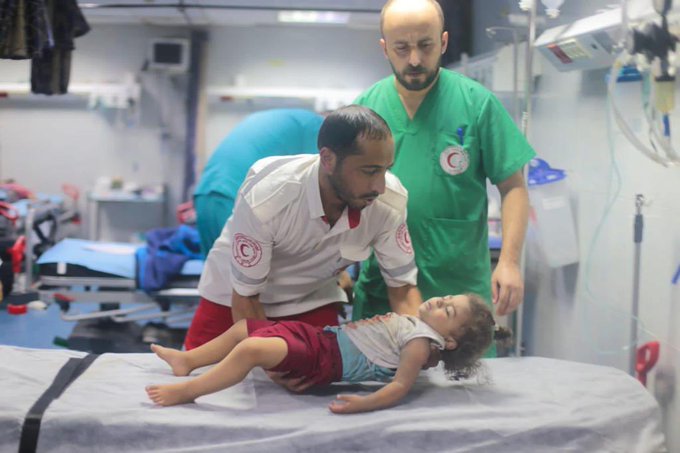
Sunday, Nov. 12, 2023 - Al-Quds hospital no longer operational
The Al Quds hospital operated by the Palestinian Red Crescent is no longer operational. A lack of power means that life-saving care can no longer be provided. This has catastrophic consequences for the people of Gaza.
Tuesday, November 7, 2023 - 1 month conflict
Currently, 1.5 million people have been forcibly displaced from their homes. Access to clean drinking water is severely limited and food supplies in Gaza are depleting. As a result, families are struggling to feed themselves. In addition, no safe shelters are available - even refugee centers have warned that their facilities will not be spared from hostilities.
In Israel, 1,400 people were killed in the initial attacks a month ago, while more than 240 are still trapped after being taken hostage and transferred to Gaza. Since Oct. 7, thousands of rockets, missiles and mortars have been fired at Israel, and these attacks continue to this day.
The partner of Belgian Red Cross-Flanders, the International Red Cross Committee, has mobilized 60 tons of humanitarian aid, consisting of medical supplies and equipment to purify 50,000 liters of water. Since the beginning of the escalation of the conflict, they have been supporting hospitals in Gaza, recently sending a surgical team and other experts to strengthen relief operations on the ground. In addition, they brought medical kits to treat 1,000 to 5,000 people with various degrees of injuries.
Israel's Magen David Adom (MDA) has so far mobilized 10,000 relief workers and treated more than 3,000 patients in the past month. As the main provider of blood products in the country, they have already collected and provided more than 47,000 units of blood.

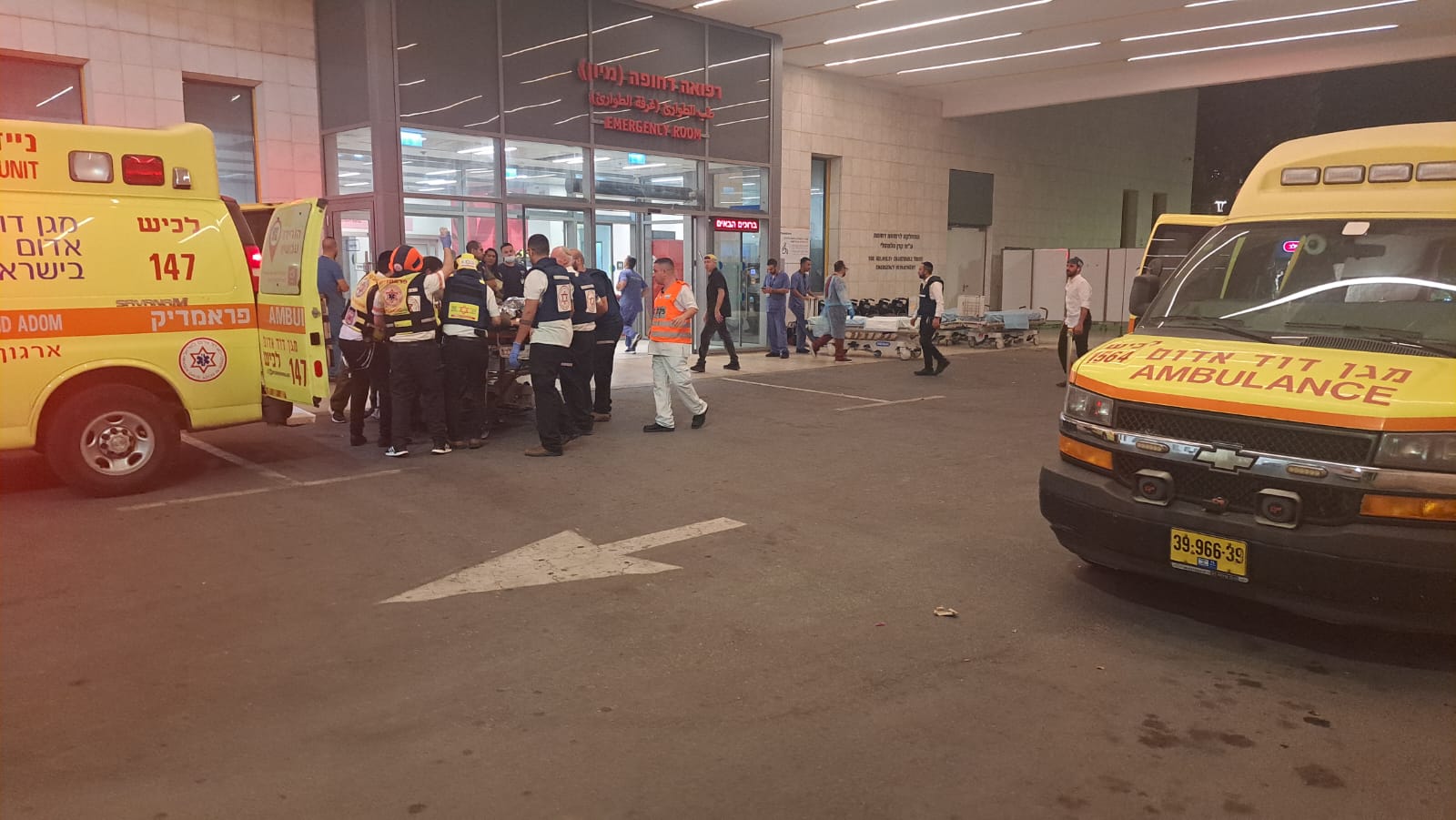
The Palestinian Red Crescent Society (PRCS) has treated 1,876 patients at the two hospitals it operates in Gaza. Through their ambulance service, they have provided care to 10,726 people in Gaza and the West Bank. Thousands of people seek shelter in their hospitals and offices, and PRCS has so far managed to provide essential relief supplies to more than 60,000 people.
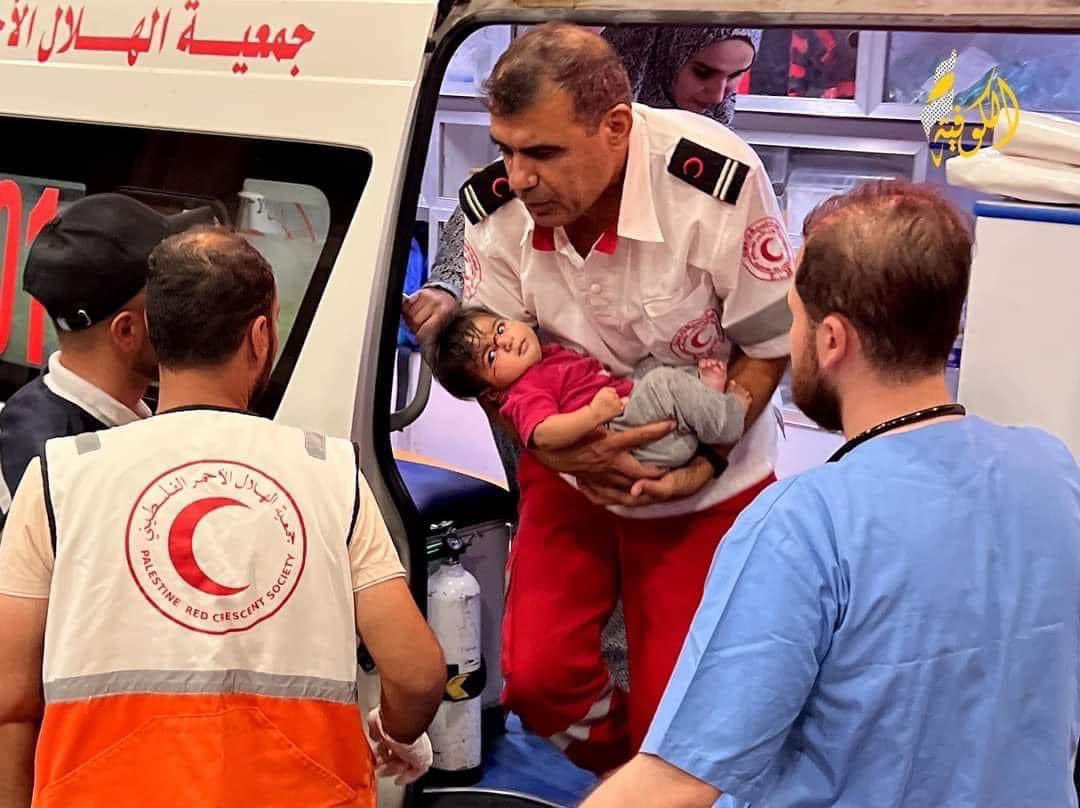
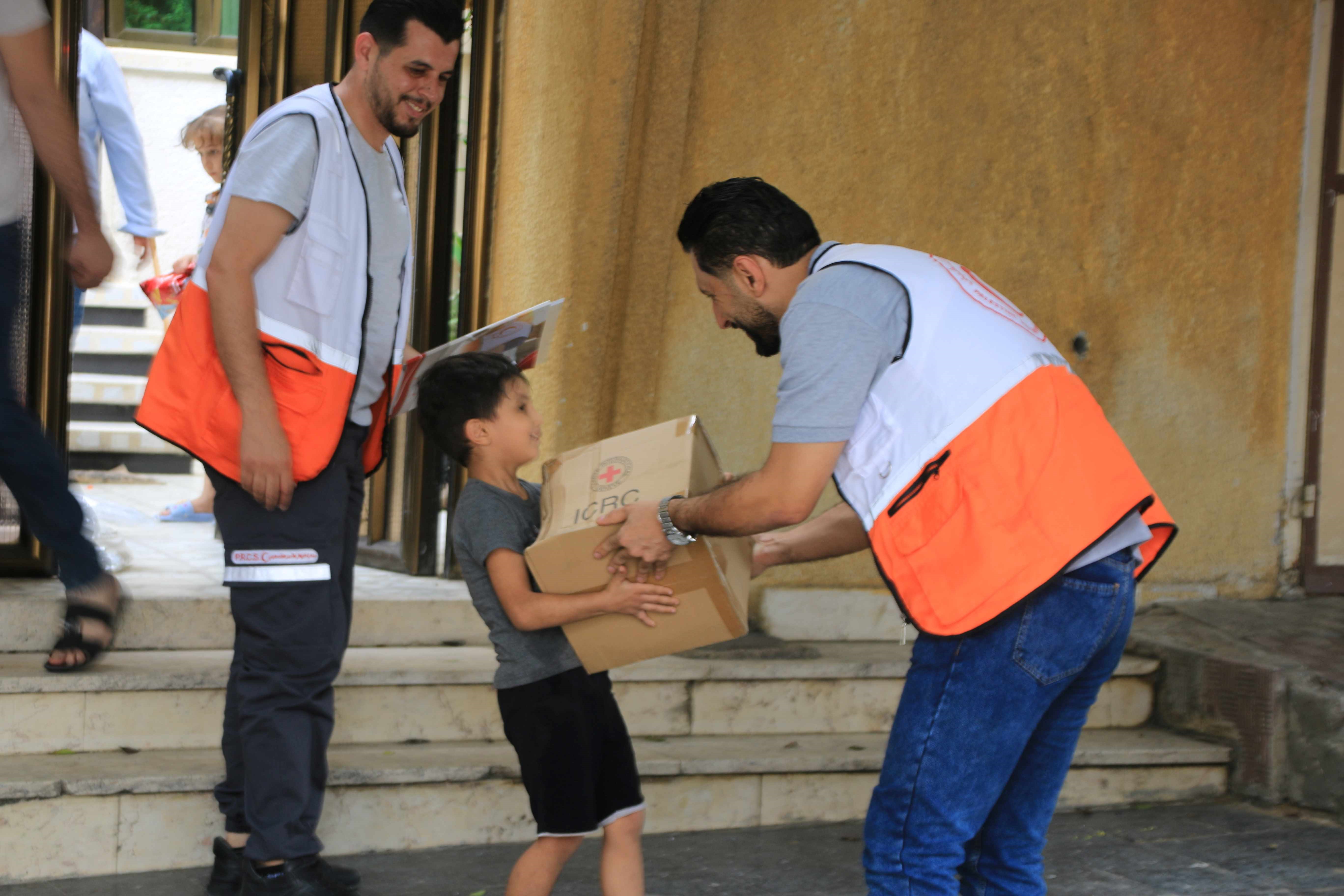
Saturday, Nov. 4, 2023 - Repatriation of 20 Belgians
In recent weeks, Gaza's border crossings have been hermetically sealed. On Wednesday, Nov. 1, an agreement was reached between Egypt, Israel and Hamas. This allowed the first people with foreign passports to leave Gaza through the Rafah border crossing with Egypt.
On Saturday evening, the first twenty Belgians flew from Egypt to Eindhoven, together with evacuated Dutch people. From there, they were transferred by bus to the military hospital in Neder-over-Heembeek, where they were received by volunteers from Belgian Red Cross-Flanders. Foreign Minister Hadja
Lahbib (MR) was also present.
Walter Wybauw coordinated the repatriation of the Belgians and, together with his colleagues, mapped out the psychosocial, medical, material and financial needs: "It is clear that there is a great need for psychological support. You hear one horror story after another. What also struck me is the hearing damage people have suffered from explosions."
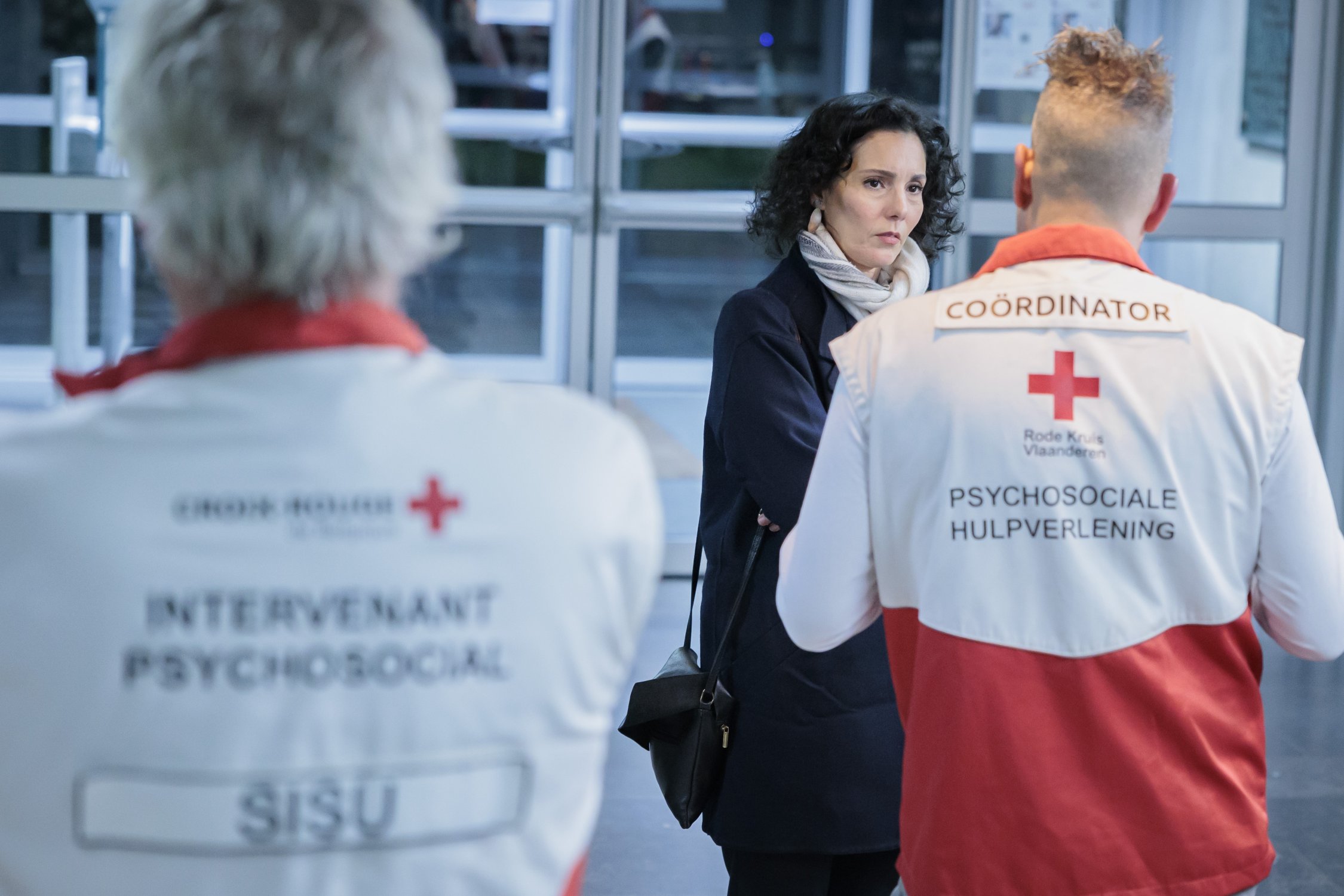
Friday, Nov. 3, 2023 - Attack ambulance Palestinian Red Crescent Moon
An ambulance belonging to the Palestinian Red Crescent was hit in front of Al-Shifa Hospital in Gaza. Although no one was killed in this incident, several ambulance and emergency service workers have lost their lives in Israel and Gaza over the past month.

Thursday, Nov. 2, 2023 - Further medical care allowed in Egypt
Mohammad Abu Musabah, Director of Emergency Medical Services in the Gaza Strip, confirmed that victims have been allowed to leave Gaza for further treatment in Egypt. The Palestinian Red Crescent is actively working on the transfer, particularly through the Rafah border.
They sincerely hope that the remaining injured will also be allowed to seek medical care soon, given the deteriorating health conditions in their hospitals.
Monday, Oct. 30, 2023 - Evacuation order Al-Quds hospital impossible.
On Sunday, Oct. 29, the Palestinian Red Crescent was ordered to immediately evacuate Al-Quds Hospital. The hospital is located in Tal Al Hawa, a neighborhood in Gaza City (northern Gaza). Hundreds of patients are currently still being treated there and about 12,000 civilians are sheltering from the bombings. An evacuation of the hospital is unfeasible because of the heavy medical needs of patients.
On Oct. 14, the Palestinian Red Crescent already posted a statement about the unfeasibility of evacuating Al-Quds Hospital. A total of at least 400 people are in the hospital in need of medical attention. These include intensive care patients on life support and babies in incubators.
Several bombings have been taking place in the immediate vicinity of the hospital since Sunday. The bombings, combined with shortages of fuel and medicine, make it extremely difficult for medical services to provide proper care. However, free transit of hospital supplies is mandated under international humanitarian law. Other hospitals in Gaza are also experiencing these problems.
The Red Cross is calling for compliance with international humanitarian law and the protection of civilians both in Israel and the Occupied Palestinian Territories. Belgian Red Cross-Flanders supports the Palestinian Red Crescent's call for protection for Al-Quds Hospital and by extension all other hospitals, as well as additional efforts to get necessary humanitarian aid to Gaza residents.
Friday, Oct. 27, 2023 - Arrival of experts and goods
Ten experts from the International Red Cross Committee, including a surgical team, arrived in Gaza along with six trucks carrying essential medical equipment and water treatment materials.
This humanitarian aid is a small relief at this time, but it is not enough. Our surgical team and medical supplies will help relieve the extreme pressure on health personnel in Gaza, but safe, sustainable humanitarian access is urgently needed. This humanitarian disaster is getting worse by the hour.
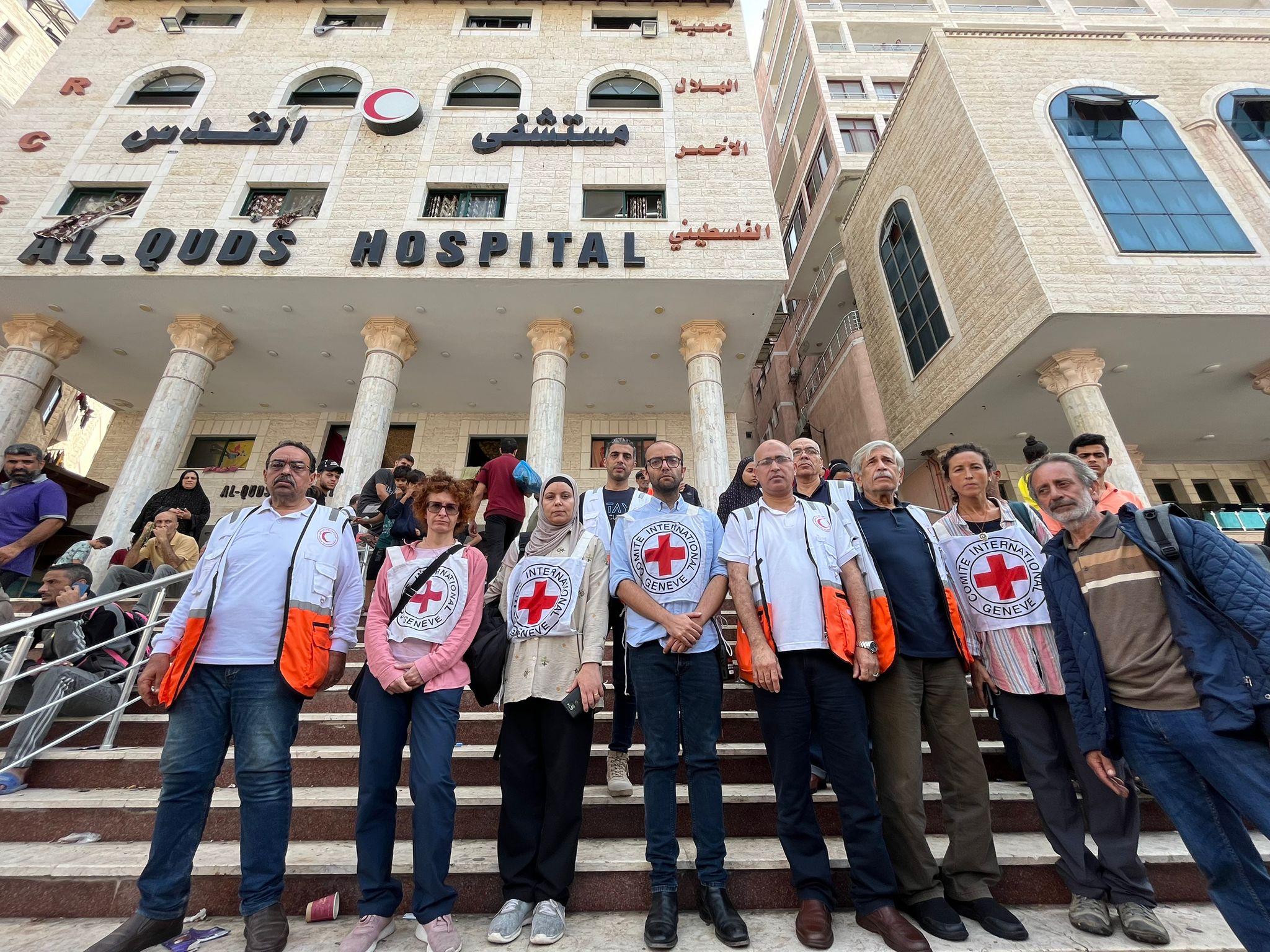
Wednesday, Oct. 25, 2023 - Call for continued support for victims.
Belgian Red Cross-Flanders collected only 9,000 euros so far for humanitarian aid following the escalation of the Middle East conflict. This while the needs of the victims on the ground are enormous. More so, the organization speaks of one of the biggest humanitarian crises in recent history.
"The financial support we receive to help the victims on the ground is in stark contrast to the great needs on the ground," said Sofie De Jaeger, Manager International Cooperation of Belgian Red Cross-Flanders. "We understand that there have been many humanitarian crises in the past 2 years and that people have already offered a lot of support before that. But the victims in the Middle East need our help now more than ever."
Read the entire news release here
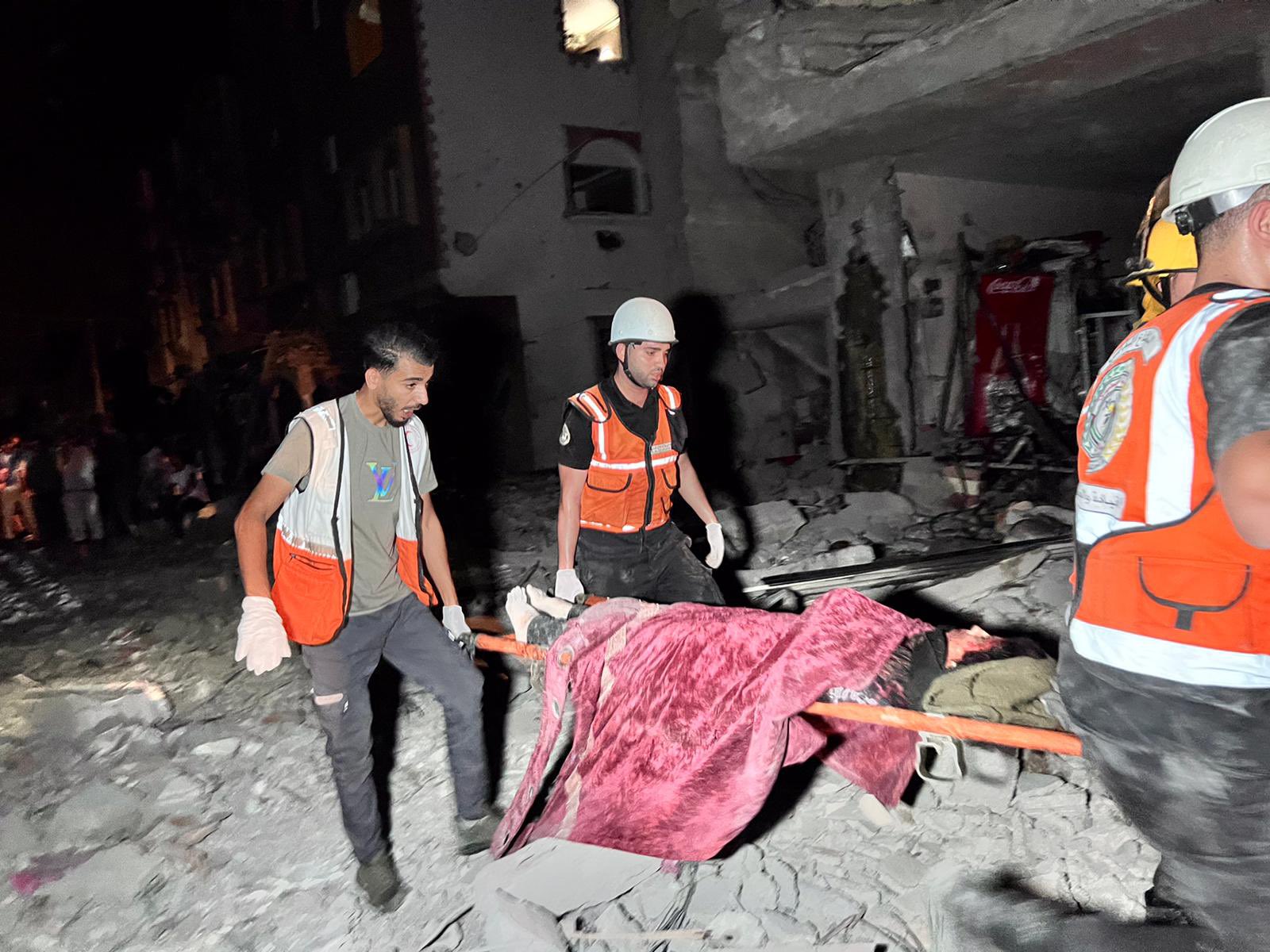
Saturday, Oct. 21, 2023 - Points of Light
Since Oct. 9, Gaza was completely cut off from goods, traffic, fuel, food, water and electricity. On Wednesday, Oct. 11, the Gaza Strip's only power plant was also shut down. Without power, hospitals cannot continue operating, with risks to many patients including newborns in incubators and elderly patients dependent on oxygen.
Aid convoy reaches Gaza
On Saturday 21/10 came the redeeming news that a first aid convoy of 20 trucks from the Egyptian Red Crescent was allowed to cross the border into Gaza to deliver relief goods to the Palestinian Red Crescent, which will further distribute them to the population. However, the humanitarian needs are enormous and the goods delivered are barely sufficient at this time. A second and third convoy also crossed the border in the meantime, and hopefully more aid can be brought into Gaza in the coming days and weeks.
Our partner, the International Committee of the Red Cross (ICRC), is also providing hospitals with much-needed equipment and supporting the water sector with fuel, logistical capacity and energy solutions for water treatment plants, potentially giving 250,000 people access to drinking water.
Hostages released
On Oct. 20, we received the hopeful news that two hostages held in Gaza have been released. The International Committee of the Red Cross assisted in this release by transporting the hostages from Gaza to Israel, underscoring the concrete impact of our role as a neutral player between the warring parties. More such humanitarian actions are urgently needed so that even more families can be reunited. Many people are still desperately waiting for news of their loved ones. The Red Cross community continues to call for the immediate release of all hostages and that both sides respect international humanitarian law.
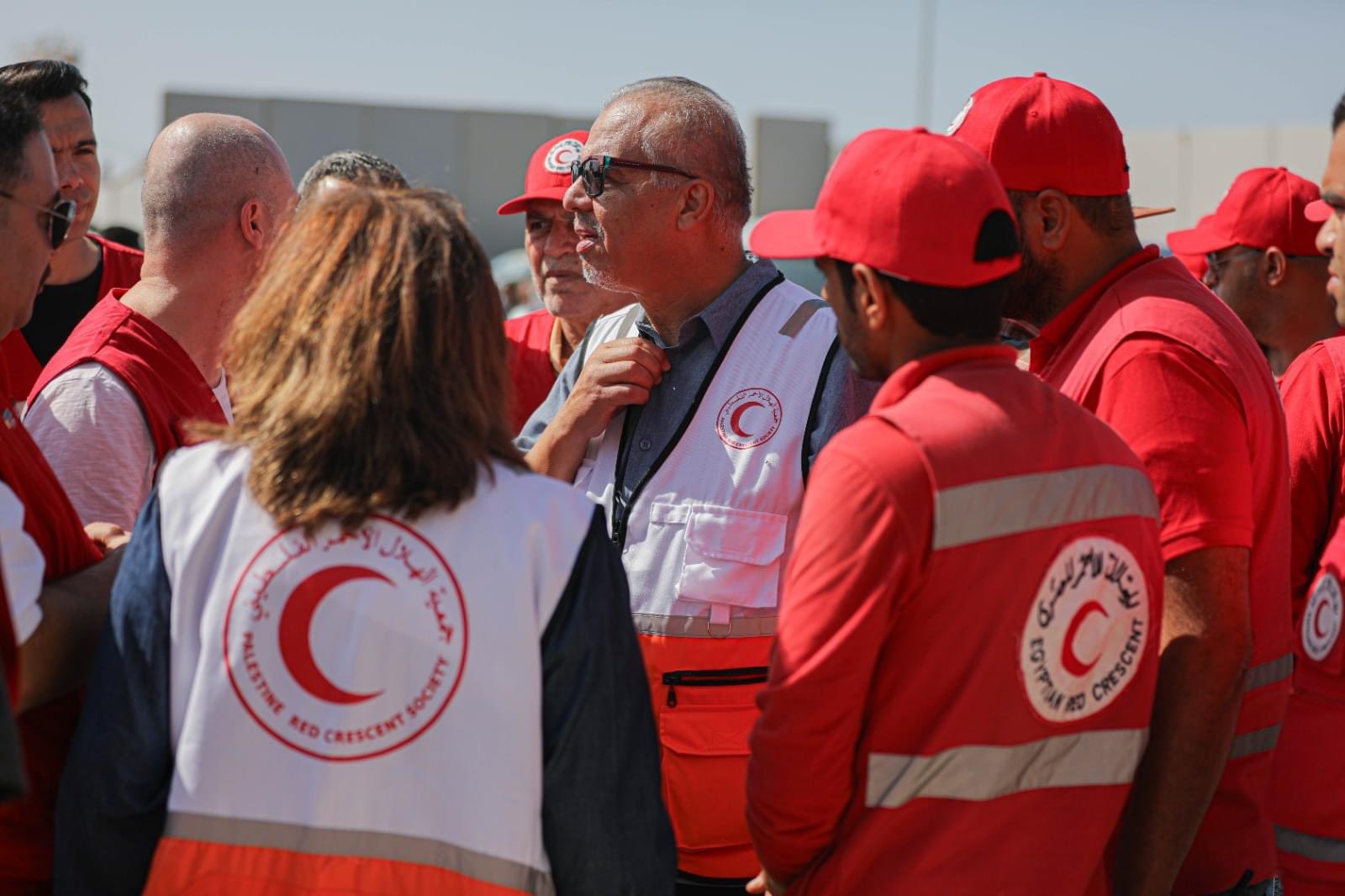
Friday, Oct. 13, 2023 - Podcast on International Humanitarian Law
Israel warned civilians in northern Gaza to leave within 24 hours. What does International Humanitarian Law say about this? Colleague Marijke Peys explains in VRT NWS' podcast 'Het Kwartier' (from 3m10).
Wednesday, October 11, 2023 - #NotATarget
Five Red Cross and Red Crescent Society aid workers were killed in Israel and the Gaza Strip.
Emergency workers should never be a target.
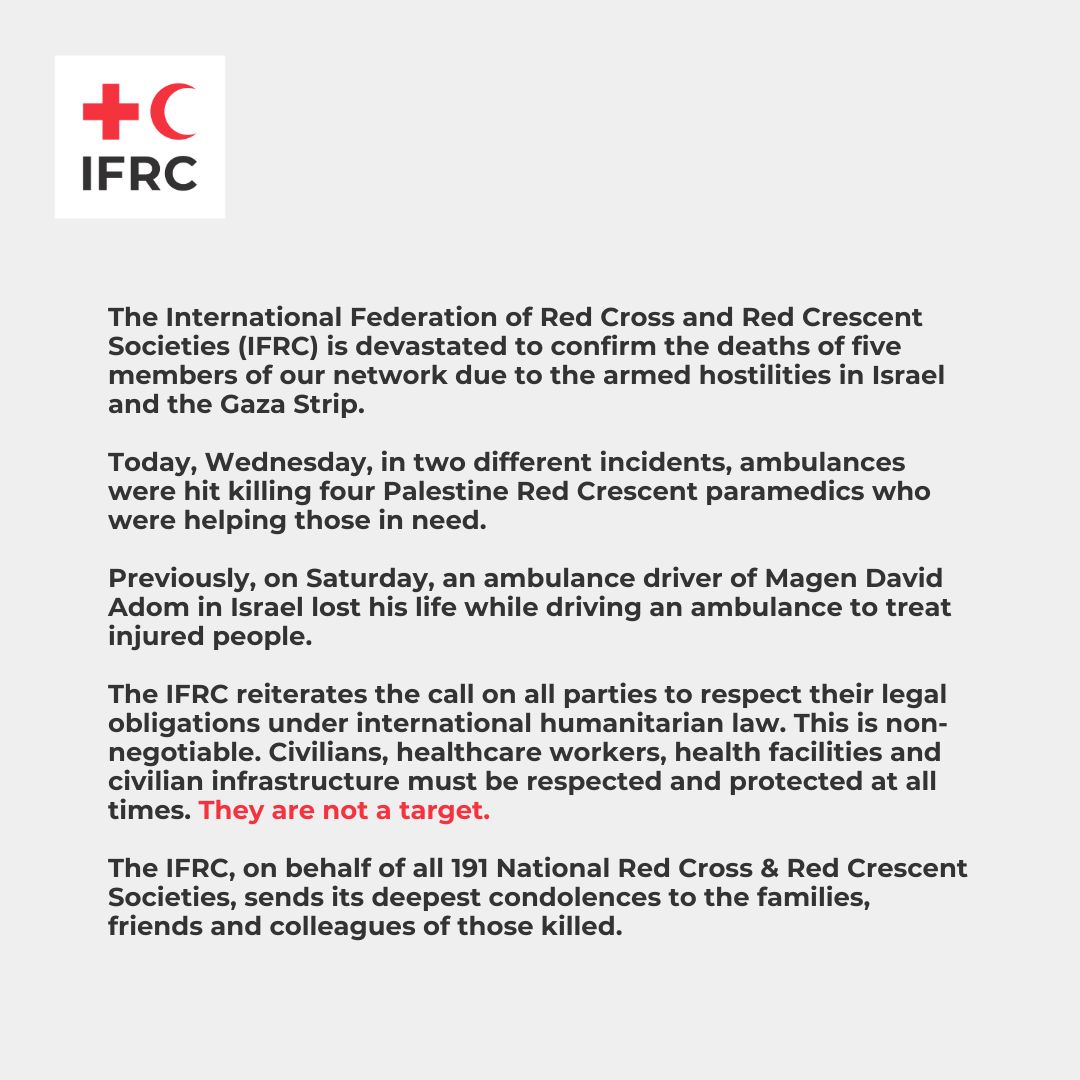
Tuesday, Oct. 10, 2023 - Belgian Red Cross-Flanders immediately donates 100,000 euros from emergency relief fund
Belgian Red Cross-Flanders is immediately donating 100,000 euros from the Emergency Relief Fund for humanitarian support to the violence in Israel and the Occupied Territories. The money will be used to assist the most vulnerable by, among other things, supporting hospitals on the ground. Flemings who also want to contribute financially can do so via the account number BE53 0000 0000 5353 stating "conflict Middle East", or simply online via this website.
The situation in Israel and the Occupied Territories is alarming, with more than 1,200 people already dead and thousands injured. Essential infrastructures such as water and energy supplies are under pressure. Food and medicine are scarce. In addition, many roads are damaged or inaccessible, making access for ambulances difficult. That is why Belgian Red Cross-Flanders is immediately releasing 100,000 euros from the emergency relief fund
"The money will be deployed through the International Red Cross, which is active on the ground in all regions. They are there now focusing on the most urgent needs of the most vulnerable victims. This is primarily about medical assistance. For example, they provide beds and stretchers - and offer general support to hospitals. Moreover, the need for this humanitarian aid will only increase in the coming days, weeks and months. After all, many signs point to the conflict escalating even further." Sofie De Jaeger, Manager International Cooperation of Belgian Red Cross-Flanders
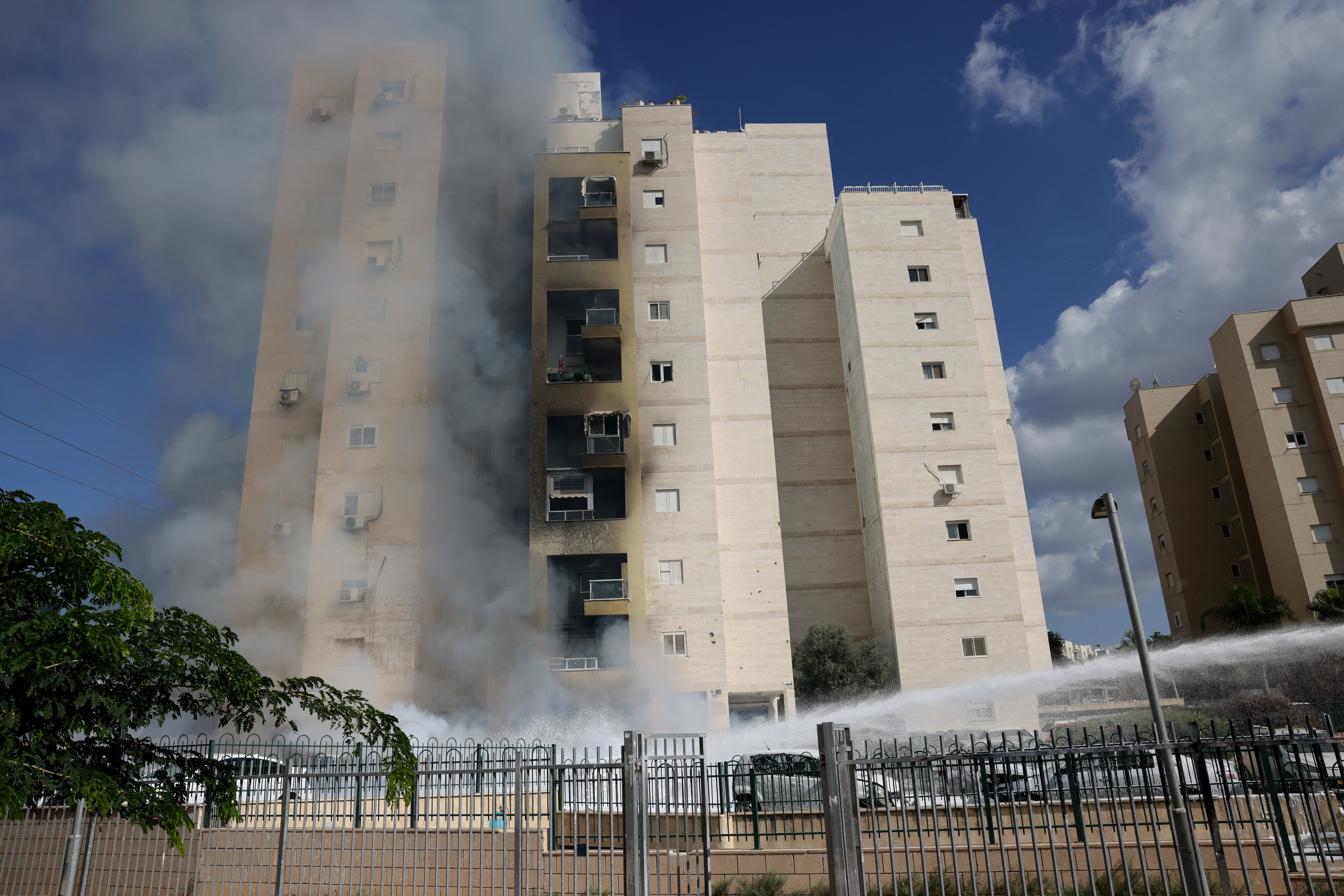 Photo credit Ahmad gharabli - AFP
Photo credit Ahmad gharabli - AFP
Monday, Oct. 9, 2023 - Seven questions about staying neutral during a war
Have you noticed it too: you see images on TV of terrible violence during a war, and then you hear that the international Red Cross and Red Crescent Movement visit the leaders of the warring parties. Why do you keep talking to everyone? And why do you never call parties to account? To these (and five other) understandable questions, we provide understandable answers.
